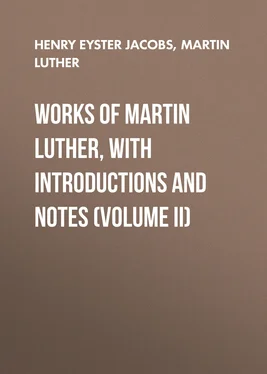Henry Eyster Jacobs - Works of Martin Luther, with Introductions and Notes (Volume II)
Здесь есть возможность читать онлайн «Henry Eyster Jacobs - Works of Martin Luther, with Introductions and Notes (Volume II)» — ознакомительный отрывок электронной книги совершенно бесплатно, а после прочтения отрывка купить полную версию. В некоторых случаях можно слушать аудио, скачать через торрент в формате fb2 и присутствует краткое содержание. Жанр: foreign_prose, foreign_religion, Философия, foreign_psychology, foreign_antique, на немецком языке. Описание произведения, (предисловие) а так же отзывы посетителей доступны на портале библиотеки ЛибКат.
- Название:Works of Martin Luther, with Introductions and Notes (Volume II)
- Автор:
- Жанр:
- Год:неизвестен
- ISBN:нет данных
- Рейтинг книги:3 / 5. Голосов: 1
-
Избранное:Добавить в избранное
- Отзывы:
-
Ваша оценка:
- 60
- 1
- 2
- 3
- 4
- 5
Works of Martin Luther, with Introductions and Notes (Volume II): краткое содержание, описание и аннотация
Предлагаем к чтению аннотацию, описание, краткое содержание или предисловие (зависит от того, что написал сам автор книги «Works of Martin Luther, with Introductions and Notes (Volume II)»). Если вы не нашли необходимую информацию о книге — напишите в комментариях, мы постараемся отыскать её.
Works of Martin Luther, with Introductions and Notes (Volume II) — читать онлайн ознакомительный отрывок
Ниже представлен текст книги, разбитый по страницам. Система сохранения места последней прочитанной страницы, позволяет с удобством читать онлайн бесплатно книгу «Works of Martin Luther, with Introductions and Notes (Volume II)», без необходимости каждый раз заново искать на чём Вы остановились. Поставьте закладку, и сможете в любой момент перейти на страницу, на которой закончили чтение.
Интервал:
Закладка:
14. It were indeed better if Christians were taught to love the ban rather than to fear it 68 68 This statement also was condemned in the papal bull.
, as we are taught by Christ to love chastisement, pain and even death, and not to fear them. But these prattlers speak only of fear in the ban, though they teach that all other chastisements and misfortunes are to be borne cheerfully. Whereby they betray their blind and cursed purpose, which is to rule by force over the people of Christ, and as it were to take the free Christian Church captive in fear. Therefore let us learn what is our chief duty with respect to the ban, namely, not to despise it or bear it impatiently, and this for two reasons. First, because the authority of the ban was given by Christ to the holy mother, the Christian Church, that is, to the community of all Christians. Therefore, in this matter we should honor and submit to our dear mother Church and to Christ. For what Christ and the Church do should have our approval, our love and our filial fear. Secondly, because the effect and purpose of the ban is beneficial and salutary and never injurious, if one endures it and does not despise it. To use a homely illustration: When a mother punishes her beloved son, whether he has deserved it or not, she certainly does not do it with evil intent, but it is a maternal, harmless and salutary punishment, if the son bears it patiently. Only when he becomes impatient, and is not influenced by it to leave the wrong or to do the good for the sake of which he is punished, but turns against his mother and despises her, does the punishment begin to do him harm; or then he offends against God, Who has commanded: "Thou shalt honor thy father and mother" [Ex. 20:12]; and out of a light, harmless, yea even beneficial chastisement he makes a terrible wrong and sin, to his everlasting pain and punishment.
15. Thus it happens in our day that certain officials 69 69 The "officials" were the administrators of this discipline, see above, p. 41.
and their associates are murdered, beaten and bound, or are in constant fear of death. Doubtless this would not occur at all, or at least much less frequently, if the people did not hold the wrong opinion that the ban is more harmful than profitable. For this reason they venture everything, and commit such crimes as it were in despair. Although this is terrible, yet by God's dispensation the tyrants get what they deserve, because they conceal the real benefit of the ban from the people, and misuse it, making no effort toward correction, but aiming simply to increase their own power. For although every one ought to endure the ban, they too ought not to despise a poor human being, be he guilty or innocent, as Christ says: "Take heed that ye despise not one of these little ones that believe on Me, for I say unto you that their angels do always behold the face of My Father which is in heaven." [Matt. 18:10] Why should they wonder if, in the providence of God, at times their heads are broken and their commands despised, because of the unjust tyrannical ban, since without ceasing they act so insolently against God's commandment? True, there is great wrong on both sides. Yet if the people were taught that the power of the ban is wholesome and necessary and that it is not ordained nor used to their hurt, but to their benefit, the officials would be in less danger, and find greater and readier obedience, nay, greater love, good will and honor among all the people.
16. Therefore the people should be taught in some such way as this: My dear people, let not those who have and use the power of the ban drive you to despair, whether they be pious or evil, whether they do you justice or injustice. The power of the ban cannot harm you, but must always be beneficial to the soul, if only you bear and endure it aright; their abuse of the ban does not hinder its virtue. Or if you cannot endure it, then try to escape from it with meekness, not with revenge and retaliation by word or deed. And in all things look not to them, but to the dear mother Church. What difference does it make to you whether she lays her rods of chastisement upon you through pious or through wicked rulers? It is and remains, nevertheless, your dearest mother's most salutary rod. From the beginning of the world it has been so, and will ever remain, that spiritual and temporal power is more often given to the Pilates, Herods, Annases and Caiaphases than to the pious Peters, Pauls and the like, and as in all other estates so in that of government there are always more of the wicked than of the pious. It is not to be supposed or hoped that we shall ever have an entirely pious government, nay, it must come as a pure git of grace or by special prayer and merit, if good government or a right use of power is to be had at all. For God punishes wicked subjects by wicked rulers, as He says: "I will give children to be their prelates and their rulers shall be childish men, I will take from them every mighty man, the wise, the prudent and the man of war," [Isa. 3:4] etc. Since, then, incapable or evil rulers are God's chastisement, and there are so many among us who deserve such chastisement, we must not be surprised if the government wrongs us and abuses its power toward us, nay, we must wonder and thank God when it does not wrong us and do us injustice.
17. Wherefore, since the world is at present overburdened, as it has abundantly deserved to be because of its heinous sins, with young, imprudent and inexperienced rulers, especially in the spiritual estate, so that this age of ours is extraordinarily perilous, we must act very prudently and by all means see to it that we hold the government and all authority in the highest honor, even as Christ honors the authority of Pilate, Herod, Annas, Caiaphas, and of the temporal rulers of His time we must not permit such grievous abuses and the childish rule of the prelates to move us to despise all authority, so that despite those unworthy persons who bear rule we may not at the same time despise their authority, but cheerfully bear what it imposes, or reuse to bear it at least with humility and proper respect. For God cannot and will not permit authority to be wantonly and impudently resisted when it does not force us to do what is against God or His commandments 70 70 A very important limitation for Luther's position.
, though they themselves do as much as they can against God, or injure us as much as they will. There are some whom He Himself would judge and condemn, and such are those great and powerful tyrants; so too, there are those whom He would help, and such are the oppressed sufferers. Therefore we should yield to this His will and leave the mighty to His sword and judgment, and allow Him to help us, as St. Paul says: "O dearly beloved brethren, neither avenge nor defend yourselves, but rather give place unto the wrath of God, because it is written. Vengeance belongs to Me alone and I will repay each one [Deut. 32:35]." [Rom. 12:19]
And yet we should humbly tell these prelates (especially should the preachers rebuke them, yet only by showing them from the Word of God) that they are acting against God and show them what He would have them do, and in addition diligently and earnestly pray to God or them; even as Jeremiah wrote to the children of Israel in Babylon that they should zealously pray or the king of Babylon, or his son and for his kingdom, although he had taken them captive, had troubled and slain them and done them all manner of evil.
And we can easily do this if we remember that the ban and all unrighteous authority cannot harm our souls, provided we submit to them, and they must ever be of profit, unless they are despised. So also are the authorities a thousandfold worse in the sight of God than we, and are therefore to be pitied rather than wickedly to be despised. For this reason we are also commanded in the law of Moses that no one shall revile the rulers, be they good or evil, even though they give great occasion. In short, we must have evil or childish rulers,—if it is not the Turk, then it must needs be the Christians. The world is far too wicked to be worthy of good and pious lords, it must have princes who go to war, levy taxes and shed blood, and it must have spiritual tyrants who impoverish and burden it with bulls and letters 71 71 See Open Letter to the Nobility, below, p. 98.
and laws. This and other chastisements are rather what it has deserved, and to resist them is nothing else than to resist God's chastisement. As humbly as I conduct myself when God sends me a sickness, so humbly should I conduct myself toward the evil government, which the same God also sends me.
Интервал:
Закладка:
Похожие книги на «Works of Martin Luther, with Introductions and Notes (Volume II)»
Представляем Вашему вниманию похожие книги на «Works of Martin Luther, with Introductions and Notes (Volume II)» списком для выбора. Мы отобрали схожую по названию и смыслу литературу в надежде предоставить читателям больше вариантов отыскать новые, интересные, ещё непрочитанные произведения.
Обсуждение, отзывы о книге «Works of Martin Luther, with Introductions and Notes (Volume II)» и просто собственные мнения читателей. Оставьте ваши комментарии, напишите, что Вы думаете о произведении, его смысле или главных героях. Укажите что конкретно понравилось, а что нет, и почему Вы так считаете.












